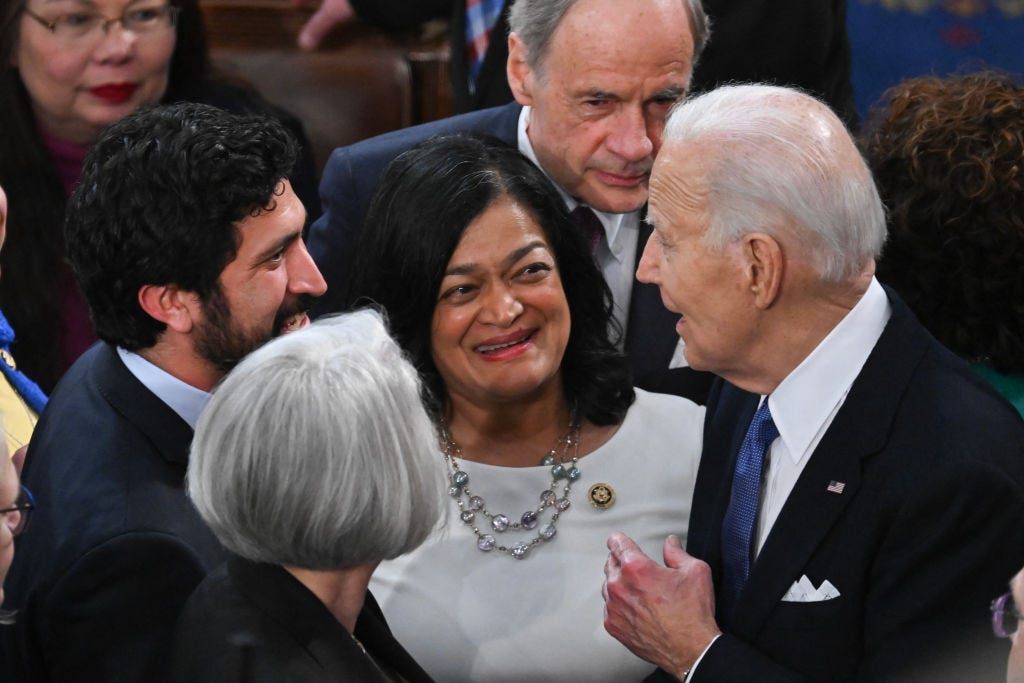An ally's blunt advice to Biden
Congresswoman Pramila Jayapal on the fraught state of the Democratic coalition, why Biden’s “superpower” is his Achilles’ heel on Gaza, and why defending democracy isn't enough to win in November
What does it take to move a president? And how much movement is enough?
Congresswoman Pramila Jayapal is a veteran of Bernie Sanders’ team and currently serves as chair of the Congressional Progressive Caucus. She’s been a resolute progressive voice, a defender of immigrant rights and reproductive freedoms, and was an early advocate for a ceasefire in Gaza.
Jayapal has also been a crucial power broker between progressives and President Biden, working closely with the White House to deliver on major legislation, from the Infrastructure Investment and Jobs Act to the Inflation Reduction Act. She’s uniquely placed to understand what it’s taken to move Joe Biden — once seen as the consummate centrist dealmaker — to embrace more progressive positions that helped motivate voters in 2020 and deliver the election.
Today, however, the broad coalition that Biden gelled together is in trouble. Discontent is building among younger and more progressive voters — critical parts of the Democratic base — over continuing American support for the Netanyahu government as it continues to pursue the war in Gaza and a sense that the economy under Biden hasn’t delivered enough help for regular people.
While the Biden-Harris campaign has been making the case that a second Trump term is a threat to democracy that Americans cannot risk, progressives like Jayapal fear that effort may not be enough to win over disillusioned voters — and that without a robust policy agenda laying out exactly what the Democrats will deliver in a second Biden term, they may not get the chance to try again.
We talked to Congresswoman Jayapal about what it’s like to work with Biden, how the Gaza war has challenged the decades-old thinking that has defined U.S. foreign policy and has exposed weaknesses in Biden’s policy approach, why Biden’s empathy is both his superpower and an obstacle to some of his biggest goals, and why a bold progressive policy agenda is the best way to fight Trumpism and preserve democracy.
It’s a conversation you won’t want to miss, with insight into how things get done in Washington from someone who’s been key to the evolution of Democratic policy positions and continues to be a voice for progressive change.
A request for those who haven’t yet joined us: The interviews and essays that we share here take research and editing and much more. We work hard, and we are eager to bring on more writers, more voices. But we need your help to keep this going. Join us today as a paid subscriber to support the kind of independent media you want to exist.
And we’re offering new paying subscribers a special discount of 20 percent. You will lock in this lower price forever if you join us now!
I'd love to hear about the origin of your relationship with then-candidate Joe Biden and how that relates to or reflects the larger progressive movement’s relationship with the person who's now President Biden.
It starts with Bernie Sanders for me, and being the chair of Bernie's health policy work during Bernie's second campaign. When it was clear that Bernie didn't have the Electoral College votes or the state votes to carry the campaign through, he called me — and we were in communication quite a bit — and said, "We are going to try and make sure that we leverage our votes and our campaign to make Joe Biden the most progressive president he can be."
And he asked me if I would consider talking to then-candidate Joe Biden. And he said that Biden was a very relationship-based person, which is something I found to be very true, and that it was really important to build a relationship with him early.
And so the president called me — or then-candidate Joe Biden called me — and we had a really wonderful conversation. It was clear to me that on health and healthcare, he was not going to be a Medicare-for-all person. So the question really was, what could we agree on? How far could we push to expand healthcare access? But more broadly, what did Joe Biden want to accomplish? And what did progressives want to accomplish? Through the task forces, we were able to establish a progressive economic agenda that was very helpful in the early shaping of Joe Biden on domestic policy.
And then we pushed very hard. It was an early strategic decision for me to say that we were pushing for the president's agenda rather than a progressive agenda. He would call me sometimes after hearing me on TV talking about the president's agenda, and I would get a call: "Pramila, it's Joe. Joe Biden."
In case you didn't know which Joe.




